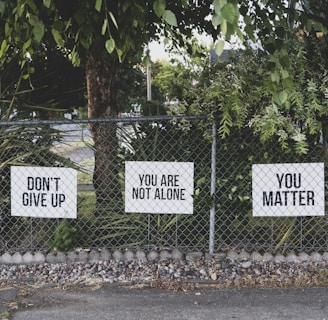10 Effective Ways to Manage Stress, Grief, and Trauma Holistically
In today's fast-paced world, stress, grief, and trauma have become common experiences. According to the American Psychological Association, 77% of people regularly experience physical symptoms caused by stress. Managing these feelings holistically not only addresses the emotional and mental facets but also considers the physical, social, and spiritual aspects of well-being. This comprehensive approach can lead to profound healing and resilience. In this blog post, we will explore ten effective ways to manage stress, grief, and trauma holistically.
Tara
3/10/20254 min read


1. Mindful Meditation
Mindful meditation is a powerful tool for holistic stress management. This practice involves focusing on the present moment with an attitude of openness and acceptance
Practical Tips
- Dedicate 10-15 minutes daily to sit quietly and focus on your breath.
- Use guided meditations, which are available online, or attend local meditation groups.
Example:
Emily, a teacher, found that incorporating meditation into her morning routine helped reduce anxiety and improved her focus throughout the day.
2. Physical Exercise
Exercise is one of the most effective offline methods for managing stress. It releases endorphins, which are natural mood lifters.
Practical Tips:
- Aim for at least 150 minutes of moderate aerobic activity or 75 minutes of vigorous activity each week.
- Try activities like yoga, swimming, or walking in nature.
Example:
John, a software engineer, started jogging every morning. He noticed a significant improvement in his mood and energy levels.


3. Journaling
Writing down your thoughts and feelings can be a therapeutic process. It helps identify patterns and triggers of stress.
Practical Tips:
- Set aside time each day to write in a journal.
- Focus on gratitude and positive experiences alongside challenges.
Example:
Sarah, dealing with grief after losing a loved one, used journaling to express her emotions and found it helped her process her grief.
4. Aromatherapy
Aromatherapy uses natural plant extracts to promote health and well-being. It's a calming offline method that can reduce stress and anxiety.
Practical Tips:
- Use essential oils like lavender or chamomile in a diffuser.
- Enjoy a relaxing bath with a few drops of essential oils.
Example:
Tom incorporated aromatherapy into his evening routine and found that it significantly improved his sleep quality.


5. Social Connections
Connecting with others is crucial for emotional health. Building a strong support network can provide comfort and reduce feelings of isolation.
Practical Tips:
- Schedule regular meet-ups with friends or family.
- Join clubs or groups that align with your interests and values.
Example:
Maya joined a local book club, which provided her with a sense of community and helped alleviate her feelings of loneliness.
6. Nutrition and Diet
Eating a balanced diet impacts not only your physical health but also your emotional well-being. Certain nutrients can help manage stress and improve mood.
Practical Tips:
- Include foods rich in omega-3 fatty acids, magnesium, and vitamins B and D.
- Stay hydrated and limit caffeine and sugar intake.
Example:
Daniel, who struggled with anxiety, noticed a considerable improvement in his mood after incorporating more fruits, vegetables, and whole grains into his diet.


7. Art Therapy
Art therapy provides a creative outlet for expressing emotions. It's an effective way to process trauma and stress without needing to verbalize feelings.
Practical Tips:
- Engage in activities like painting, drawing, or sculpting.
- Attend art therapy workshops or classes.
Example:
Anna, who faced trauma after a car accident, found solace in painting, which helped her express emotions she couldn't articulate.
8. Nature Therapy
Spending time in nature can have a calming effect and reduce stress. Nature therapy, also known as ecotherapy, emphasizes the healing power of the natural environment.
Practical Tips:
- Take daily walks in natural settings, such as parks or forests.
- Practice mindfulness while observing nature.
Example:
Michael, overwhelmed with work stress, began hiking on weekends and found it revitalized his spirit and improved his mood.


9. Breathing Exercises
Breathing exercises are simple yet effective offline methods for reducing stress and anxiety. They help calm the nervous system.
Practical Tips:
- Practice deep breathing or diaphragmatic breathing for a few minutes daily.
- Utilize apps or online tutorials for guided breathing exercises.
Example:
Linda, who experienced panic attacks, incorporated breathing exercises into her routine and noticed a decrease in their frequency and intensity.
10. Professional Counseling
Seeking help from a mental health professional provides a safe space to explore and address underlying issues.
Practical Tips:
- Consider different types of therapy, such as cognitive-behavioral therapy or trauma-focused therapy.
- Look for counselors who specialize in holistic approaches.
Example:
James, dealing with trauma from childhood, sought counseling and found it instrumental in his healing journey.


Conclusion
Holistic stress management involves a multifaceted approach to healing and well-being. By incorporating these strategies into your life, you can better manage stress, grief, and trauma. Remember, it's important to prioritize self-care and recognize the impact of suppressing stress. Which of these methods resonates with you? How can you integrate them into your daily routine to foster resilience and healing?
In exploring these paths, you'll find that managing stress, grief, and trauma holistically is not only possible but deeply rewarding. Embrace the journey and take one step at a time towards a healthier, more balanced life.


